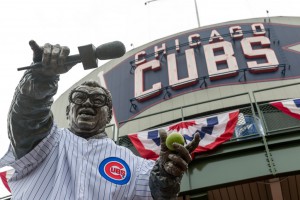Over the past year, many famous radio and TV broadcasters for sports have retired or stepped down from their larger roles into a less demanding job.
Sports broadcasting is similar to some professional sports where you start at the bottom of the chain and do your best to work your way up. For instance, in baseball, you get drafted and start off playing in the lowest level of minor league baseball. Eventually, you work your way up through double-A and triple-A all the way up to the majors.
In broadcasting, you begin by calling games that aren’t on the big networks, but many announcers continue to move up in the ranks and eventually work for ESPN or CBS doing primetime games.
Bob Costas has worked for NBC Sports since the early 1980s and has always had an iconic voice. Costa’s most well known event is the Olympics. He has been the prime-time host for the past twelve Olympic Games. Costas recently stepped down from this position, handing the job over to Mike Tirico. He will continue his career by broadcasting MLB Network Showcase games and working with the Sunday Night Football crew.
Costas has arguably one of the most memorable voices in broadcasting and is the face of the Olympic coverage in the U.S. Here are some of his greatest moments of his career.
WATCH: http://www.nbcsports.com/video/bob-costas-olympic-legacy-greatest-moments
Another iconic broadcaster is Verne Lundquist. He called his final college football game on December 10, 2016, in the classic Army Navy Game. Lundquist began his career calling Dallas Cowboys games on the radio before heading over to the national stage with ABC Sports, TNT cable, and CBS. After his stint at ABC, he worked for CBS for thirteen years, then left to go to TNT. After two years he rejoined CBS and has been there ever since.
One of his most famous calls was during the Elite Eight in 1992 between Duke and Kentucky. There was 2.1 seconds left in the game and Duke was down one needing the perfect full-court pass and the perfect shot. Grant Hill executed the pass to Christian Laettner and it was all history from there.
“There’s the pass to Laettner, puts it up, yes!” said Lundquist, as Laettner’s shot went through the net and the Blue Devils advanced to the Final Four.
Lundquist has no formal retirement date yet, as he will continue to call March Madness games and the Masters from the 16th hole. He gave an emotional goodbye to college football after the Army-Navy Game, talking about his career and ride as a broadcaster.
WATCH: https://www.youtube.com/watch?v=W73lgQ6–Hs
ESPN has had its fair share of famous broadcasters that stepped down this past year, one of them being Lee Corso. His role on College Gameday, a pregame show for college football that airs every Saturday of the season. From 1953-1957 Corso played quarterback for Florida State. After his career ended, Corso went on to coach multiple teams at the college level.
His final coaching job was with the Orlando Renegades of the USFL in 1985 and two years later he began his broadcasting time with ESPN. For twenty years now, Corso has been on College Gameday with last season being his final one.
At the end of the show, the analysts make their “Saturday Selection’s” for the games being played that week. Corso is famously known for putting on the mascot headgear of the team he selects at the end of the show.
Over the years there has been many memories created by his headgear picks. Now, ESPN looks for the next announcer to take over Corso’s position on the show and try to keep the tradition of using the team’s headgear.
https://www.youtube.com/watch?v=GT2eIngZvsM
The final broadcaster who passed away 19 years ago is Harry Caray. He had been a famous sports radio and television broadcaster for five Major League Baseball teams. He did the bulk of his work with the St. Louis Cardinals and the Chicago Cubs
Caray called Cubs games until he died at the age of 93 before the beginning of Spring Training in February of 1998. He worked for WGN-TV, which became a big television network across the United States.
The “Seventh-inning stretch” is one of the greatest traditions in all of baseball. Caray was asked to lead the crowd in singing the song over the PA system for the Chicago White Sox’s games. At first he declined, but then decided to do it and continued it for the White Sox and Cubs when he went to the North side of Chicago.
Caray welcomed famous people in the booth throughout his career as a broadcaster. He had the President at the time, Ronald Reagan, in the booth during one of the broadcasts. He left a lasting legacy on broadcasters across baseball and created the seventh-inning stretch tradition that the Cubs have carried on, now having famous people sing the song.
https://www.youtube.com/watch?v=OxyjkXrUzdE
Broadcasters often affect how enjoyable watching a sporting event on television is, making it an important and difficult job to perform. These are just a few of the broadcasters that have made an impact on the sports they commentate on and the community of sportscasters.

Leave a Reply